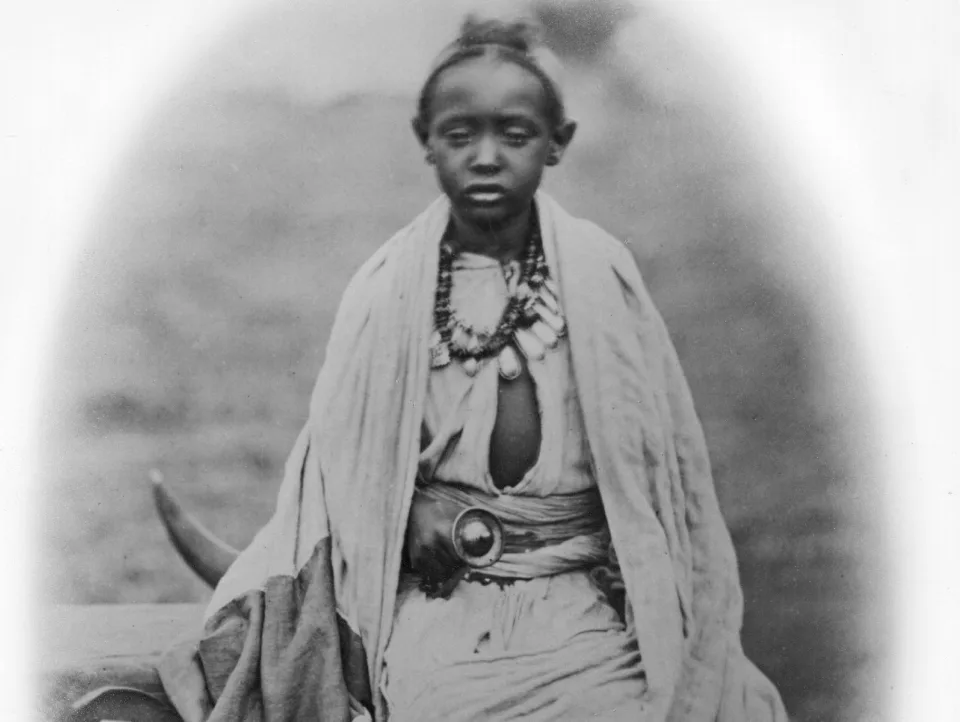May 07, 2023 (GMN) - In the back row of a class photograph taken at Rugby School in 1876, you can spot just one person of colour, peering out shyly from behind one of his more confident teenaged classmates.
Who was that wistful-looking dark-skinned boy in a sea of white upper-class faces? His name was Prince Alamayu, the orphaned son of Tewodros II of Ethiopia, so actually the most aristocratic of the lot. In this fascinating, haunting book, which takes us from a high mountain plateau in Ethiopia to Osborne on the Isle of Wight where Alamayu met and charmed Queen Victoria, and all too soon to the catacombs of St George's Chapel Windsor, Andrew Heavens tells the astonishing story of the uprooting of this lost boy.
King Tewodros II, known as 'Mad King Theodore', longed to be friends with the British, and in 1855 he wrote an imploring letter to Queen Victoria: 'For the love of Christ, I want friendship . . .'
He received no reply, so he wrote her another letter. This too lay unread on a desk in the Foreign Office. Fed up, Tewodros imprisoned the few British envoys who were in Ethiopia and kept them in chains in a high mountain jail. His message to the British was: 'Respond, or watch your envoys rot in jail.'
It was time to take on mad King Theodore, who was becoming increasingly unpredictable: one day he threw 197 Ethiopian prisoners over a precipice in a bad mood. 'Whatever it may cost,' declared the Foreign Secretary of the envoys' incarceration, 'we cannot accept an insult from any uncivilised tribe.'
So a vast army of 39,000 British troops was sent in to rescue the 44 hostages. It all went like clockwork: they snaked their way up to the plateau, rescued the hostages, and killed 700 Ethiopians at a loss of only two of their own. The King, defeated, shot himself.
And back down the mountain the British Army went, grabbing treasures out of the local churches as they passed. They also took with them the Queen, who died on the way down the mountain, and little Prince Alamayu, now aged seven, whose whole world had exploded: he'd lost his father, his mother, and his home. No wonder, in photographs taken at the time, he looks bewildered and tragically sad.
Enter, at this moment, a very jolly British character, who would become Alamayu's guardian the one person in the world he clung to and loved. This was the marvellously named Captain Tristram Speedy: a 6ft 6in muscular giant with a beard, who liked to dress in full Ethiopian warrior gear complete with shield and spear.
Was it really true (as Speedy claimed) that Alamayu's dying mother said to him, 'Please take on my son and treat him as your own?' No one is sure. But Speedy eagerly took Alamayu under his wing, bringing him back to England by ship.
They tried to get him to play a ball game on deck, but he said 'Am I not a king's son? Why should I go and fetch it?' For the next three months, Alamayu, prone to screaming nightmares, could not sleep except in Speedy's arms.
Alamayu's first words when he arrived on the shores of Britain? 'Oh, this beautiful country! I will never go back!'
But did he really say that? Another man recalled 70 years later that Alamayu said when he was a man, 'he would go back to Abyssinia and kill all the Englishmen who were so cruel to his father'.
Speedy took his young charge to Osborne to meet Queen Victoria, who wrote in her diary that he was 'a very pretty sight, a graceful boy with beautiful eyes and a nice nose and mouth, though the lips are slightly thick.
She wanted him to stay on the Isle of Wight, learning croquet, cricket, and horsemanship. But Speedy landed a job in India and took Alamayu with him. After two years, the Treasury took control of Alamayu's future, to the distress of both Speedy and the Queen.
The boy was sent to Rugby, where he struggled academically. And then to Sandhurst, where he received no marks at all for one exam paper. He retook and failed again.
Was this a conscious effort on his part to bring to a juddering halt the statesmen's plans for him to join the British Army? Perhaps.
Here we begin to see, as Heavens puts it, that 'all the trauma, the separation, and abuse, were working away at him from inside . . . and backed up into a cesspool of self-hate.' Not that the British had abused him physically; they had just brazenly plucked him out of his native land and all he knew. He was a traumatised, directionless and depressed teenager.
When he fell asleep out of doors on one cold night, he caught pneumonia and then refused to eat. Prayers were said for him in Rugby school chapel. He died in 1879, aged only 18.
'Very grieved and shocked,' wrote Queen Victoria. 'He was so sensitive, thinking that people stared at him because of his colour, that I fear he would never have been happy.'
He was buried at St George's Chapel, Windsor.
There have been calls from Ethiopia for his body to be repatriated, but these have been rejected. It would be impossible, wrote the Lord Chamberlain, to verify the Prince's remains, while attempting to do so would disturb 'the resting places of others in the vicinity'.
We know, says the author, that a few months before his death Alamayu expressed 'a hankering after his own country'. Just over 140 years on, he concludes, 'it is about time to listen to Alamayu's wishes and let him go home.'





